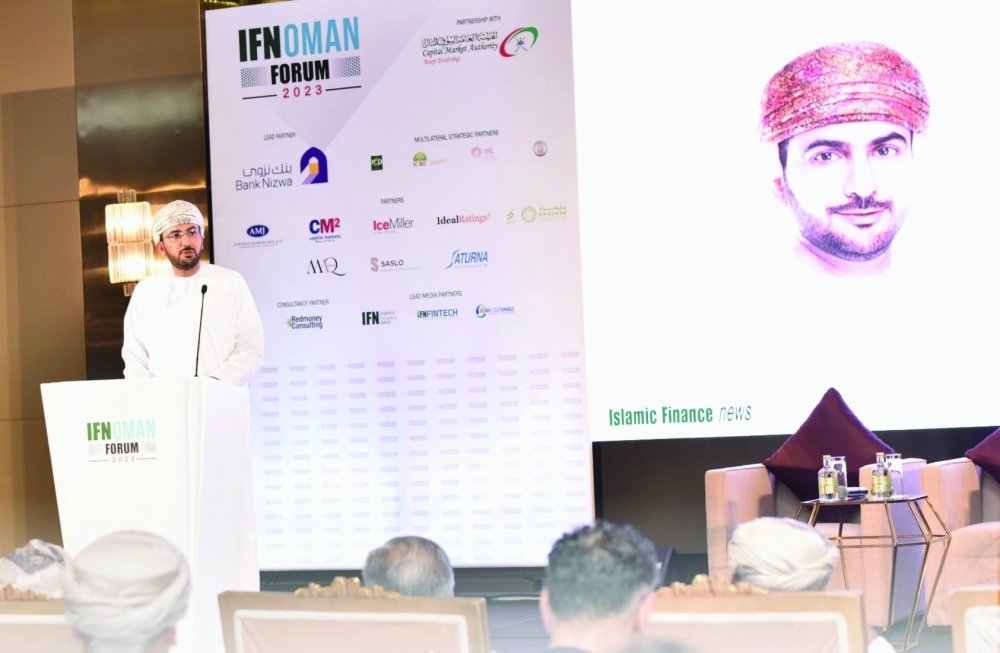

MUSCAT: The IFN Oman Forum 2023, held on September 12, brought together financial experts, regulators and industry leaders to delve into Oman’s remarkable journey in the realm of Islamic finance. The event shed light on a decade of Islamic finance in Oman, highlighting its pivotal role in fostering the private sector, key market developments, regulatory challenges and a promising future rooted in Islamic financial principles.
The keynote address was delivered by Ahmed bin Ali Saif al Maamari (pictured), Executive Vice-President of Capital Market Authority (CMA). Oman’s Islamic banking and finance sector may be relatively young in comparison to its GCC counterparts, but it has been rapidly gaining momentum.
Al Maamari said, “The share of the Shariah-compliant capital market reached 12 per cent of the total value of the capital market, reaching RO 2.9 billion until the end of 2022. Takaful insurance accounts for 14 per cent of the total insurance portfolio with premiums exceeding RO 72 million.”
Based on data from the Central Bank of Oman (CBO), during the first half of 2023, Islamic banking assets had gained a significant portion of the market, accounting for 17.2 per cent. This noteworthy percentage indicated a year-on-year growth rate of 12.6 per cent, resulting in a total asset value of RO 7 billion. Islamic banking institutions in Oman offered financing amounting to RO 5.8 billion by the end of June 2023, experiencing a growth of 12.8 per cent compared to the previous year.
The total deposits held by Islamic banks and windows showed a 10.5-per cent increase, reaching RO 5.2 billion by the end of June this year, compared to the previous year. This surge in assets illustrated the growing appetite for Islamic financial products among Oman’s populace.
Furthermore, the Islamic capital market in Oman has flourished, with the government repeatedly issuing sovereign Sukuk instruments for both institutional and retail investors. These offerings consistently attracted strong demand, demonstrating the vibrancy of Oman’s Islamic financial sector.
Additionally, Oman is exploring new avenues for growth, particularly in the fintech domain, which promises to unlock fresh opportunities and innovations within Islamic finance. A key driving force behind Oman’s success story in Islamic finance has been the concerted efforts of regulatory bodies, notably the Capital Market Authority and the Central Bank of Oman.
These institutions have played pivotal roles in shaping the industry’s trajectory. Through the formulation of effective policies and measures, along with ongoing engagement with stakeholders, they have nurtured a conducive environment for Islamic finance to thrive.
One of the prominent discussions at the IFN Oman Forum 2023 revolved around the role of Islamic finance in stimulating the private sector in Oman. Panelists include Kemal Rizadi Arbi, Adviser to CMA Oman; Khalid al Kayed, CEO, Bank Nizwa; Sharifatul Hanizah, Executive Director of Islamic Capital Market Development, Securities Commission Malaysia; and Thamer al Shahry, Lawyer and Partner at Said al Shahry & Partners.
During the session, moderated by Asad Qayyum, Managing Partner of MAQ Legal, panellists and experts recognised Islamic finance as a catalyst for private sector development.
Its principles align with ethical and sustainable business practices, making it an attractive financing option for businesses looking to expand while adhering to Islamic values.
Another focal point of the forum was the key market developments within Oman’s Islamic financial landscape. These included remunerative deposit accounts, the potential issuance of treasury Sukuk, and the introduction of Wakalah money market liquidity management tools.
These initiatives aim to diversify the product offerings in Oman’s Islamic finance sector, providing investors with a broader range of opportunities and enhancing the sector’s resilience.
Addressing regulatory concerns was also a crucial part of the discussions. The treatment of Islamic banks following mergers with conventional institutions and the development of a robust Shariah governance framework and audit guidelines were examined in detail.
These issues underscored the need for clear and consistent regulatory standards to maintain the integrity and trustworthiness of Islamic finance in Oman.
Furthermore, the forum offered insights into new regulations governing the issuance of bonds and Sukuk in Oman.
These regulations are expected to enhance transparency and efficiency in the issuance process, further bolstering the appeal of Islamic debt instruments to both local and international investors.
Oman Observer is now on the WhatsApp channel. Click here



